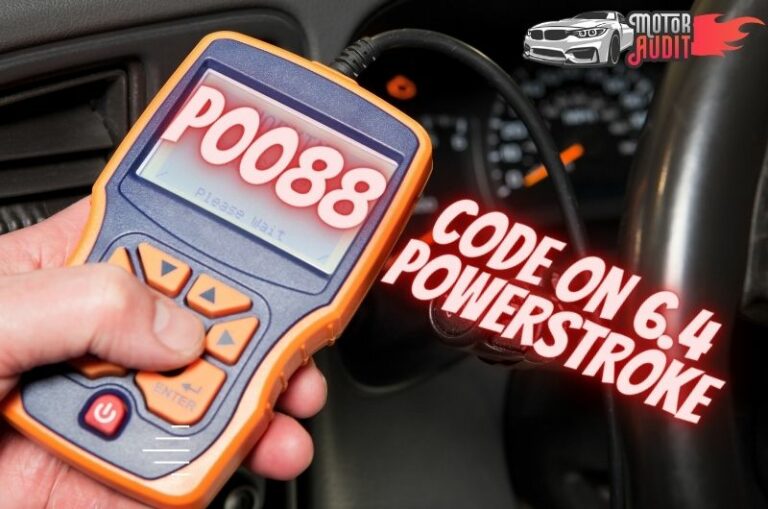What Are The Symptoms Of A 7.3L Powerstroke Turbo Failure?
If you like your truck producing a lot of power, then you will love a turbocharger when you install one in your truck.
The turbocharger, or “turbo,” helps to produce a strong fuel system while reducing harmful emissions into the environment.
Although, turbos are supposed to boost your engine power they are not immune to problems. You may face turbo failure if it goes bad over time.
This article will help you to detect the common symptoms of the 7.3L Powerstroke turbo and the possible solution to those problems.
Signs Of 7.3L Powerstroke Turbo Failure
When the turbo is failing the first thing you will notice is excessive smoke or oil loss from your vehicle.
It may also make some peculiar noises like rattling or whining and your car will slow down eventually as a result of turbo failure. These signs are pretty common on the 7.3L Powerstroke turbos when it is malfunctioning.
What Are The Symptoms Of 7.3L Powerstroke Turbo Failure?
There are other additional symptoms you may face when your turbo has failed. Let us learn about those symptoms and how to detect 7.3L Powerstroke turbo failure-
1. Excessive Exhaust Smoke
Turbos are designed specially to reduce the amount of exhaust smoke. If you see a lot of smoke, it’s because your turbo has failed. Emission of black and blue smoke can also be seen.
The cracked turbo housing causes an oil leak into the combustion chamber and causes the blue smoke to emit again Black smoke.
On the other hand, it might be caused by a burnt engine, clogged air filters, contaminated air intake duct to the turbo compressor, or defect in your engine’s fuel injectors.
Basically, if the casing of your turbocharger cracks or the seals is worn out it will cause oil leakage into your exhaust. And the burning oil will cause an excessive amount of smoke.
2. Poor Acceleration
Turbos initial job is to increase the speed of your vehicle’s engine.
While running, your car may not accelerate as rapidly as predicted or generate as much power as expected. You may also get delayed response and your vehicle’s overall power may lack due to a failing turbocharger.
3. Loud Siren Noise
Turbocharged vehicles are known to make pleasant noises. But if you are facing very strange and loud noises it may be a symptom of a faulty turbocharger.
The sounds produced by your car as a result of a malfunctioning turbo are similar to sirens. This strange noise might be caused by a broken pipe or defective blades in the turbo system.
4. Increased Oil Consumption
If you find your automobile using more oil than normal, that may be because your turbocharger is leaking oil into the manifold. It may eventually cause the turbo to fail.
5. “Check Engine” Light
Though the check engine light doesn’t specify which internal problem your vehicle is facing but if your check engine lights up on your dashboard it may be a sign of your malfunctioning turbo.
If you are unsure about the check engine light you definitely should go to a mechanic to know why this is happening.
6. The Boost Gauge
Some turbocharged cars include a boost gauge, which indicates how much boost the turbo is producing. This is an excellent way of finding out how well your turbocharger is functioning.
If you observe a reduction in boost, it is an indication that the performance of your turbocharger has been affected.
7. Black And Blue Smoke
When oil leaks into the exhaust system due to the crack in the turbo housing, it produces a distinctive blue smoke as it burns off. On the other side, a burned engine, clogged air filter, obstructed air intake
duct to the turbo compressor, etc., can cause black smoke. If the turbocharger is causing this symptom, you are highly likely to see the colored smokes as the engine revolutions increase right after the idling.
However, whatever color the smoke is, you should take your car to your mechanic as it is a very bad sign.
What To Do When You Detect 7.3L Powerstroke Turbo Failure?
You may consider replacing your 7.3L Powerstroke turbocharger now that you know it has failed.
I would recommend you to take your vehicle to a qualified technician as soon as you start noticing the symptoms.
The longer you leave it, the more damage it will do and the more expensive it will be to repair the problem. The specialists can examine your car and advise you on whether or not you need to replace the turbo.
Is Replacing 7.3L Powerstroke Turbo Typically Expensive?
Since turbo engine is a vital part of your vehicle and replacing it is not an easy job, we have a bad news for you; putting a new turbo diesel isn’t going to be cheap.
The precise cost of turbocharger replacement may vary based on the generation of the 7.3L Powerstroke engine.
The average cost for a Ford 7.3L Powerstroke turbocharger replacement is between 2300$ to 2900$. Labor costs are estimated between 360$ and 460$.
How Often Should You Inspect Or Service Your 7.3L Powerstroke Turbo?
The most common issues with turbochargers are heat and lubrication. Conventional bearings would fail very soon due to the extraordinarily high speed at which the turbo is needed to spin.
A fluid bearing – is a thin coating of oil that separates the mechanical components to avoid wear and keep the moving parts of the compressor or the turbine cool – is used in turbochargers.
The majority of turbocharger failures are caused by insufficient lubrication or foreign particles in the oil.
This implies that oil changes at predetermined intervals, oil, and air filter system maintenance, and oil pressure management are the most important maintenance needs for a turbocharged engine.
Another very common question is can you fix the turbo! The answer is you can check for a range of faults yourself by inspecting the turbo.
By making sure your vehicle’s air filter, exhaust system, breather system, and fuel system are all in good operating order, since these can all create symptoms similar to turbo failure.
The Verdict
Though the turbocharger is designed to increase your vehicle’s engine power, it can also reduce your vehicle’s speed if it fails.
Whether you start seeing the above-mentioned symptoms, check to see if the turbo is truly failing, and then go to a mechanic who will finally offer you some advice on what to do and what not to do.
- Read Also>>Fix P0087 Code On 6.7 Powerstroke: Fuel Rail Pressure Is Low
- Read Also>>What Does P2285 Code Mean On 6.0 Powerstroke? Cause & Fix
- Read Also>>How to Fix P1000 Code On Ford F150? (Complete Solutions)
- Read Also>>How To Fix P0603 Code On 6.0L Powerstroke? (Explained)
- Read Also>>Why Does 6.0 Powerstroke Starving For Fuel? (Cause and Fix)


